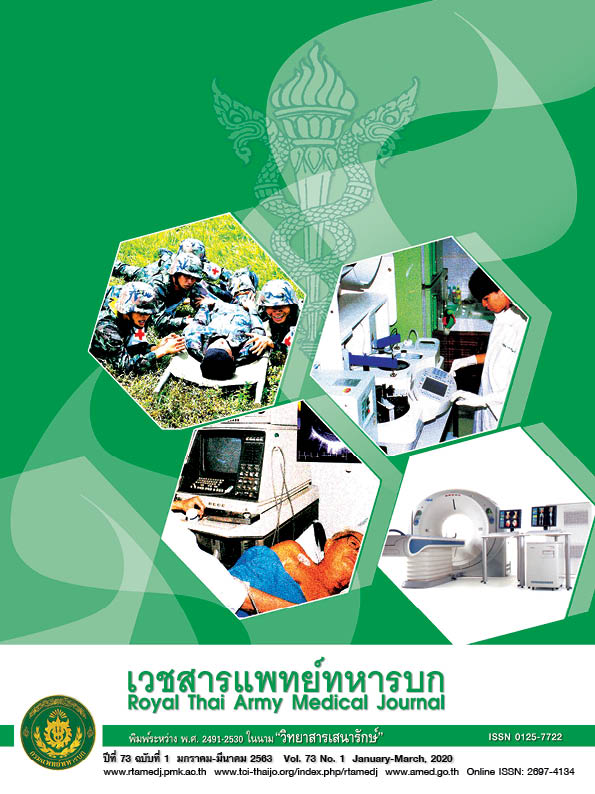ผลของการกระตุ้นภาวะขาดเลือดในร่างกาย ในการป้ องกันภาวะไตวายเฉียบพลัน จากสารทึบรังสีจากการตรวจเอกซเรย์คอมพิวเตอร์ในผู้ป่วยโรคไตเรื้อรัง: การศึกษาแบบสุ่มและมีกลุ่มควบคุม
Main Article Content
บทคัดย่อ
ความสำคัญและที่มา: โรคไตเรื้อรังเป็นปัจจัยเสี่ยงที่สำคัญของการเกิดภาวะไตวายเฉียบพลันจากสารทึบรังสี การกระตุ้นให้เกิดภาวะขาดเลือดของอวัยวะ เช่น แขนหรือขา ในร่างกายชั่วคราว อาจมีประโยชน์ในการป้องกันอวัยวะที่สำคัญจากภาวะขาดเลือด เช่น หัวใจ และไต อย่างไรก็ตามประโยชน์ที่ได้จากการกระตุ้นภาวะขาดเลือดในร่างกาย ในการป้องกันภาวะไตวายจากสารทึบรังสียังไม่ชัดเจน วัตถุประสงค์: เพื่อศึกษาประโยชน์การกระตุ้นภาวะขาดเลือดในร่างกาย ในการป้องกันการเกิดภาวะไตวายเฉียบพลันจากสารทึบรังสี จากการตรวจเอกซเรย์คอมพิวเตอร์ในผู้ป่วยโรคไตเรื้องรัง วิธีดำเนินงานวิจัย: งานวิจัยนี้เป็นการศึกษาการทดลองแบบสุ่มและมีกลุ่มควบคุมแบบเปิด เก็บข้อมูลในผู้ป่วยโรคไตเรื้อรังที่มีอัตราการกรองของไตน้อยกว่า 60 มล./นาที/พื้นที่มวลกาย 1.73 ตร.ม. ที่ได้รับสารทึบรังสีจากการตรวจเอกซเรย์คอมพิวเตอร์ในโรงพระมงกุฎเกล้า ในช่วง กรกฎาคม 2561 ถึง มกราคม 2562 โดยแบ่งผู้ป่วยออกเป็นสองกลุ่มคือ กลุ่มที่ได้รับการกระตุ้นให้เกิดภาวะขาดเลือดในร่างกาย (รัดแขน) และกลุ่มที่ไม่ได้รับการรัดแขน (ควบคุม) ในอัตราส่วน 1:1 โดยการใช้วิธี block of 4 ซึ่งจะรัดแขนด้วยเครื่องวัดความดัน ด้วยความดัน 200 มม.ปรอท นาน 5 นาที หลังจากนั้นคลาย 5 นาที ทั้งหมด 4 รอบ ภายในเวลา 45 นาที ก่อนได้รับสารทึบรังสี โดยเฝ้าระวังภาวะแทรกซ้อนอย่างใกล้ชิด ผู้ป่วยทุกคนจะได้รับการดูแลตามมาตรฐานเพื่อป้องกันภาวะไตวายเฉียบพลันจากสารทึบรังสี ผลการศึกษา: ผู้ป่วยโรคไตเรื้อรังทั้งหมด 70 ราย (35 รายในกลุ่มรัดแขน และ 35 รายในกลุ่มควบคุม) อายุเฉลี่ย 73.6±9.9 ปี มีค่าอัตราการกรองผ่านไตก่อนได้รับสารทึบรังสีเฉลี่ย 45.3±12.2 มล./นาที/พื้นที่มวลกาย 1.73 ตร.ม. มีผู้ป่วยชาย 42 ราย (60%) อัตราการเกิดภาวะไตวายเฉียบพลันจากสารทึบรังสีต่ำกว่าในกลุ่มรัดแขน (ร้อยละ 8.57 เทียบกับ ร้อยละ 0), p-value เท่ากับ 0.07 การเปลี่ยนแปลงของค่าครีแอทินินที่ 48 ชั่วโมงเทียบกับเริ่มต้น และ 48 ชั่วโมง เทียบกับที่ 24 ชั่วโมง ดีกว่าในกลุ่มรัดแขน คือ -0.09±0.16 เทียบกับ -0.02±0.20, p-value เท่ากับ 0.13 และ 0.00±0.12 เทียบกับ 0.08±0.17 มก./ดล., p-value เท่ากับ 0.03 ตามลำดับ การเปลี่ยนแปลงของค่าอัตราการกรองของไตที่ 48 ชั่วโมงเทียบกับ 24 ชั่วโมง ดีกว่าในกลุ่มรัดแขน; -0.0±5.4 เทียบกับ -2.4±6.3 มล./นาที/พื้นที่มวลกาย 1.73 ตร.ม. ผู้ป่วยในกลุ่มรัดแขนมี 25 ราย (ร้อยละ 71.4) ที่มีอาการชาแขนบริเวณที่รัด และมีอาการเจ็บแขนบริเวณที่รัด 18 ราย (ร้อยละ 51.4) ให้คะแนนปวดเฉลี่ย 3.1±1.2 จากคะแนนเต็ม 10 คะแนน ซึ่งอาการดีขึ้นทันทีหลังหยุดรัดแขน
Downloads
Article Details
บทความในวารสารนี้อยู่ภายใต้ลิขสิทธิ์ของ กรมแพทย์ทหารบก และเผยแพร่ภายใต้สัญญาอนุญาต Creative Commons Attribution-NonCommercial-NoDerivatives 4.0 International (CC BY-NC-ND 4.0)
ท่านสามารถอ่านและใช้งานเพื่อวัตถุประสงค์ทางการศึกษา และทางวิชาการ เช่น การสอน การวิจัย หรือการอ้างอิง โดยต้องให้เครดิตอย่างเหมาะสมแก่ผู้เขียนและวารสาร
ห้ามใช้หรือแก้ไขบทความโดยไม่ได้รับอนุญาต
ข้อความที่ปรากฏในบทความเป็นความคิดเห็นของผู้เขียนเท่านั้น
ผู้เขียนเป็นผู้รับผิดชอบต่อเนื้อหาและความถูกต้องของบทความของตนอย่างเต็มที่
การนำบทความไปเผยแพร่ซ้ำในรูปแบบสาธารณะอื่นใด ต้องได้รับอนุญาตจากวารสาร
เอกสารอ้างอิง
importance of acute renal failure after percutaneous coronary intervention. Circulation. 2002 ;105(19):2259-64.
2: Gruberg L, Mintz GS, Mehran R, Gangas G, Lansky AJ, Kent KM, et al. The prognostic implications of further renal function deterioration within 48 h of interventional coronary procedures in patients with pre-existent chronic renal insufficiency. J Am Coll Cardiol. 2000;36(5):1542-8.
3: James MT, Samuel SM, Manning MA, Tonelli M, Ghali WA, Faris P, et al. Contrast-induced acute kidney injury and risk of adverse clinical outcomes after coronary angiography: a systematic review and meta-analysis. Circ Cardiovasc Interv. 2013;6(1):37-43.
4. Aubry P, Brillet G, Catella L, Schmidt A, Benard S. Outcomes, risk factors and health burden of contrast-induced acute kidney injury: an observational study of one million hospitalizations with image-guided cardiovascular procedures. BMC Nephrol. 2016; 17(1): 167.
5. Atanda AC, Olafiranye O. Contrast-induced acute kidney injury in interventional cardiology: Emerging evidence and unifying mechanisms of protection by remote ischemic conditioning. Cardiovasc Revasc Med. 2017; 18(7): 549-53.
6. Machado MN, Nakazone MA, Maia LN. Acute kidney injury based on KDIGO (Kidney Disease Improving Global Outcomes) criteria in patients with elevated baseline serum creatinine undergoing cardiac surgery. Rev Bras Cir Cardiovasc. 2014; 29(3): 299-307.
7: Hoole SP, Heck PM, Sharples L, Khan SN, Duehmke R, Densem CG, et al. Cardiac Remote Ischemic Preconditioning in Coronary Stenting (CRISP Stent) Study: a prospective, randomized control trial. Circulation. 2009;119(6):820-7.
8: Er F, Nia AM, Dopp H, Hellmich M, Dahlem KM, Caglayan E, et al. Ischemic preconditioning for prevention of contrast medium-induced nephropathy: randomized pilot RenPro Trial (Renal
Protection Trial). Circulation. 2012;126(3):296-303.
9. Luo SJ, Zhou YJ, Shi DM, Ge HL, Wang JL, Liu RF. Remote ischemic preconditioning reduces myocardial injury in patients undergoing coronary stent implantation. Can J Cardiol. 2013; 29(9): 1084-9.
10. Igarashi G, Iino K, Watanabe H, Ito H. Remote ischemic pre-conditioning alleviates contrast-induced acute kidney injury in patients with moderate chronic kidney disease. Circ J. 2013; 77(12): 3037-44.
11: Yamanaka T, Kawai Y, Miyoshi T, Mima T, Takagaki K, Tsukuda S, et al. Remote ischemic preconditioning reduces contrast-induced acute kidney injury in patients with ST-elevation myocardial infarction: a randomized controlled trial. Int J Cardiol. 2015;178:136-41.
12. Savaj S, Savoj J, Jebraili I, Sezavar SH. Remote ischemic preconditioning for prevention of contrast-induced acute kidney injury in diabetic patients. Iran J Kidney Dis. 2014; 8(6): 457-60.
13: Xu X, Zhou Y, Luo S, Zhang W, Zhao Y, Yu M, et al. Effect of remote ischemic preconditioning in the elderly patients with coronary artery disease with diabetes mellitus undergoing elective drug-eluting stent implantation. Angiology. 2014;65(8):660-6.
14. Gholoobi A, Sajjadi SM, Shabestari MM, Eshraghi A, Shamloo AS. The Impact of Remote Ischemic Pre-Conditioning on Contrast-Induced Nephropathy in Patients Undergoing Coronary Angiography and Angioplasty: A Double-Blind Randomized Clinical Trial. Electron Physician. 2015; 7(8): 1557-65.
15: Balbir Singh G, Ann SH, Park J, Chung HC, Lee JS, Kim ES, et al. Remote Ischemic Preconditioning for the Prevention of Contrast-Induced Acute Kidney Injury in Diabetics Receiving Elective Percutaneous Coronary Intervention. PLoS One. 2016;11(10):e0164256.
16: Kahlert P, Hildebrandt HA, Patsalis PC, Al-Rashid F, Jánosi RA, Nensa F, et al. No protection of heart, kidneys and brain by remote ischemic preconditioning before transfemoral transcatheter aortic valve implantation: Interim-analysis of a randomized single-blinded, placebo-controlled, single-center trial. Int J Cardiol. 2017;231:248-254.
17: Walsh SR, Boyle JR, Tang TY, Sadat U, Cooper DG, Lapsley M, et al. Remote ischemic preconditioning for renal and cardiac protection during endovascular aneurysm repair: a randomized controlled trial. J Endovasc Ther. 2009;16(6):680-9.
18: Menting TP, Sterenborg TB, de Waal Y, Donders R, Wever KE, Lemson MS, et al. Remote Ischemic Preconditioning To Reduce Contrast-Induced Nephropathy: A Randomized Controlled Trial. Eur J Vasc Endovasc Surg. 2015;50(4):527-32.
19: Healy DA, Feeley I, Keogh CJ, Scanlon TG, Hodnett PA, Stack AG, et al. Remote ischemic conditioning and renal function after contrast-enhanced CT scan: A randomized trial. Clin Invest Med. 2015;38(3):E110-8.
20. Rassaf T, Totzeck M, Hendgen-Cotta UB, Shiva S, Heusch G, Kelm M. Circulating nitrite contributes to cardioprotection by remote ischemic preconditioning. Circ Res. 2014; 114(10): 1601-10.
21. Murillo D, Kamga C, Mo L, Shiva S. Nitrite as a mediator of ischemic preconditioning and cytoprotection. Nitric Oxide. 2011; 25(2): 70-80.
22. Claytor RB, Aranson NJ, Ignotz RA, Lalikos JF, Dunn RM. Remote ischemic preconditioning modulates p38 MAP kinase in rat adipocutaneous flaps. J Reconstr Microsurg. 2007; 23(2): 93-8.
23: Zarbock A, Schmidt C, Van Aken H, Wempe C, Martens S, Zahn PK, et al; RenalRIPC Investigators. Effect of remote ischemic preconditioning on kidney injury among high-risk patients undergoing cardiac surgery: a randomized clinical trial. JAMA. 2015;313(21):2133-41.
24. Zarbock A, Kellum JA. Remote Ischemic Preconditioning and Protection of the Kidney--A Novel Therapeutic Option. Crit Care Med. 2016; 44(3): 607-16.
25: Kashani K, Al-Khafaji A, Ardiles T, Artigas A, Bagshaw SM, Bell M, et al. Discovery and validation of cell cycle arrest biomarkers in human acute kidney injury. Crit Care. 2013;17(1):R25.


